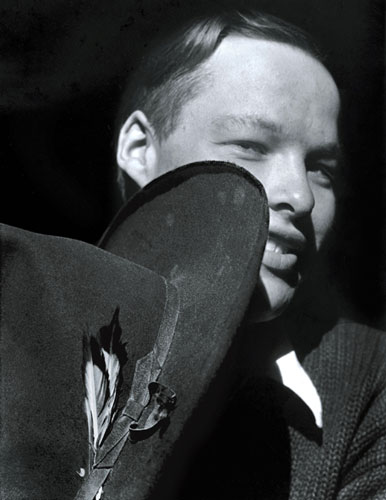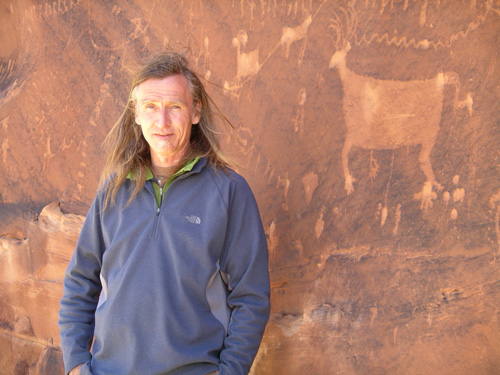|
Back to "Monthly Program History"
November 18,
2009
"Everett Ruess and the Canyon Country:
A 75-year old disappearance remains a
mystery"
by Vaughn Hadenfeldt -
Bio
In 1934, Everett
Ruess departed from Escalante, Utah for a trip in the canyon country
of the Southwest, at a time when it was even wilder than today. The
Los Alamos Mountaineers launch many trips into this country, and
they all come back. Everett Ruess did not. The 20-year-old explorer,
poet, and artist was never seen again. In the last three quarters of
a century, he has become an icon for the unspoiled canyon
wilderness, thanks to his art, and to poetry like the following:
"As to when I revisit civilization,
it will not be soon. I have not tired of the wilderness. I prefer
the saddle to the streetcar, and the star-sprinkled sky to the
drool, the obscure and difficult leading into the unknown. It is
enough that I am surrounded with beauty. This had been a full, rich
year. I have left no strange or delightful thing undone I wanted to
do."

Canyon adventurer, poet, and artist Everett Ruess disappeared
without a trace in 1934. The search for Ruess is the focus of this
presentation by Vaughn Hadenfeldt.
Ruess seemed to vanish from the
face of the earth. For 75 years, there has been not a single trace
of him, not a single item of physical evidence. Recently, a major
effort to solve the mystery was sponsored by the National
Geographic. The expedition included Vaughn Hadenfeldt of tiny Bluff,
Utah.
At the November meeting of the Los Alamos
Mountaineers, Vaughn will tell the story of the expedition's
discoveries. National Geographic Adventure claimed to have found the
final resting place of Everett Ruess. But recent DNA evidence
disproved their claim, and Ruess' fate remains as mysterious as
ever.
In addition to the search for Everett Ruess, Vaughn
will share his stories and images of the landscape and archeology of
southeast Utah. That area holds the most abundant concentration of
rock art and ruins in the country. The mesa and canyon scenery is
spectacular wonders of flora, fauna, and geology abound; and hidden
around every corner are sites of the Anasazi – now termed Ancestral
Puebloans, but to the Navajo, who donated the name to our language,
the "Ancient Enemies".

Adventure
guide Vaughn Hadenfeldt explaining ancient imagery
on a panel near Bluff, Utah.
Vaughn Hadenfeldt has
been guiding in the Four Corners region for over 25 years. While
owning and operating a mountaineering store on the western slope of
Colorado, he traveled with a friend to the canyon country in
southeast Utah and was captivated by the incredible archaeological
treasures of the region. Vaughn made use of his studies in
anthropology and his passion for hiking in the backcountry to create
a guide business that specializes in sharing his knowledge of the
cultural and natural histories of the area while providing a fun and
fascinating backcountry experience for his guests. Named as one of
the Best Guides in the World by National Geographic Adventure
Magazine in 2009, he is widely renowned and has been written about
in books and magazines published around the world. Vaughn and his
wife have lived in Bluff for 13 years.
To quote David
Roberts' "In Search of the Old Ones", "Nuances of canyonscape,
vestigial Anasazi ruins, all-but-vanished panels of prehistoric rock
art, mountain lion tracks, inscriptions scratched by cowboys with
bullet lead on sandstone walls a century ago – all these prodigies
of the outback Vaughn manages to discover in places where I would
have passed them blithely and ignorantly by."
|